This article was co-authored by Joseph Whitehouse, MA, DDS. Dr. Joseph Whitehouse is a board certified Dentist and the Former President of the World Congress on Minimally Invasive Dentistry (WCMID). Based in Castro Valley, California, Dr. Whitehouse has over 46 years of dental experience and counseling experience. He has held fellowships with the International Congress of Oral Implantology and with the WCMID. Published over 20 times in medical journals, Dr. Whitehouse's research is focused on mitigating fear and apprehension patients associate with dental care. Dr. Whitehouse earned a DDS from the University of Iowa in 1970. He also earned an MA in Counseling Psychology from California State University Hayward in 1988.
wikiHow marks an article as reader-approved once it receives enough positive feedback. In this case, 85% of readers who voted found the article helpful, earning it our reader-approved status.
This article has been viewed 89,110 times.
If you have never worn a partial denture, it may take a little while for your mouth to get used to it. The dentures could feel uncomfortable and foreign for the first several weeks. Luckily, the pain that dentures cause is temporary and can be alleviated. Also, eating and drinking may feel different than they did before. However, with practice and over time, these actions will seem more natural. Taking care of your health is important and a part of that is taking care of your mouth and your dentures.
Steps
Dealing with Denture Pain
-
1Visit your dentist to have your dentures properly adjusted. Tell your dentist where the dentures are causing discomfort. Make sure to wear your dentures the day before your adjustment visit. This will allow your dentist to clearly see red or raw areas of your gums.
- Do not try to adjust your dentures yourself. A professional dentist will make sure the adjustment will still allow your dentures to stay in place and the seal remains intact.
- Most dentists will schedule a follow-up appointment a few days to a week after your dentures are put in place. However, if you are having unmanageable pain before your appointment, call the dentist’s office to make schedule an appointment as soon as possible.
-
2Rinse your mouth with salt water to relieve pain and swelling. Dissolve 1 tsp (4.9 ml) of salt in 1 c (0.063 US gal) of boiling water. Once the water has cooled to a warm or room temperature, swish it around in your mouth for 30 seconds. Do not do this rinse daily, as the salt water can erode tooth enamel.[1]
- You can use a salt water rinse every other day for a week at the most. If the pain persists, contact your dentist so they can recommend other pain relieving alternatives.
- This method reduces swelling in the gums and cleanses the irritated area/s.
Advertisement -
3Take over the counter (OTC) pain relief medication to ease discomfort. Consult your doctor to determine which pain reliever, such as ibuprofen, acetaminophen, or aspirin, would be right for you to manage pain caused by your dentures. Ibuprofen and aspirin are classified as nonsteroidal anti-inflammatory drugs and relieve pain and inflammation by blocking the effect of chemicals called cyclo-oxygenase enzymes. Acetaminophen is classified as an analgesic and relieves pain, but not inflammation.[2]
- Make sure to follow the label instructions and your doctor's recommendation for how often and dosage to take.
- All three types of pain relievers come in tablet, liquid, and capsule forms.
- Depending on other medications you may be taking, and other lifestyle choices and factors, one pain reliever may be more appropriate than others.
- OTC pain relievers should be taken on a temporary basis.[3] If pain persists, consult your dentist.
-
4Wear your dentures as much as possible to get used how they feel faster. While you are expected to take out your dentures while you sleep, try to leave them in as much as you can during the day.[4] The more you wear the dentures, the faster your mouth will get used to them.
- In the beginning, you may need to take out your dentures several times per day to give your mouth and gums a break. However, after a few weeks, you should be able to leave them in throughout the day.
Eating and Drinking with Dentures
-
1Eat soft foods for the first 2 to 3 days. Eat soft foods like applesauce, mashed potatoes, yogurt, hot cereals, and pudding.[5] Your gums may be sore and these foods will be the easiest to chew and swallow.
- After the first few days, experiment with more solid foods such as rice, bread, fish, and beans.
-
2Avoid hard and/or sticky foods. Try not to eat sticky, hard, and tough foods very often (once or twice a week) while you are wearing your dentures as they can move your them out of place and allow food to get underneath, which can irritate your gums.[6]
- Foods like toffee, steak, and nuts can also damage or dislodge dentures as they force your jaw to apply uneven pressure. Over time, this will make the dentures wear unevenly which could cause jaw pain.
-
3Eat hot liquids and foods carefully. Eat these foods and drinks slowly, paying attention to how they feel before taking large bites or sips. It will take 3 to 4 days for you to adjust to the new heat sensitivity.[7]
- You will be less sensitive to heat because dentures insulate your mouth.
- Examples of foods to be careful with are coffee, tea, soup, stew, chili, potatoes, beans, and cooked vegetables.
-
4Strengthen your cheek muscles to have more control while eating. Use facial exercises like pressing the inside of your cheeks against your teeth while pulling back the corners of your mouth and pursing your lips. This facial movement strengthens the buccinators, or cheek, muscles.[8]
- Strengthening cheek muscles will allow for better control when chewing and sucking liquids.
Caring for Partial Dentures
-
1Use a denture brush or regular tooth brush to clean the denture daily. The brush you use should have medium-length bristles. Use denture tooth paste, denture creams, or denture soaking solution.
- Brush the entire denture, not just the teeth, before you place the dentures into your mouth[9]
- While cleaning, make sure to do it over a sink or basin of water or towel. If dentures are dropped on a hard surface, they could break.
-
2Do not allow dentures to dry out. Leave dentures in a cup of water or denture-soaking solution when they are out of your mouth. Typically, this will be overnight. Ask your doctor to recommend suitable denture-cleaners or denture-soaking solutions.[10]
- Do not leave dentures in hot water or bleach.
-
3Visit your dentist to have your dentures repaired if necessary. Do not attempt to repair your dentures yourself. If they break, chip, crack, or become too loose, a professional should be consulted to make the proper fix.[11]
- Usually you dentist can make the repair within the same day. Depending on the difficult of the repair, the process could take from 1 to 3 hours. However, if it is an especially complicated break, the dentures may have to be sent to a dental lab.
Expert Q&A
-
QuestionHow can I make my partial dentures more comfortable?
 Joseph Whitehouse, MA, DDSDr. Joseph Whitehouse is a board certified Dentist and the Former President of the World Congress on Minimally Invasive Dentistry (WCMID). Based in Castro Valley, California, Dr. Whitehouse has over 46 years of dental experience and counseling experience. He has held fellowships with the International Congress of Oral Implantology and with the WCMID. Published over 20 times in medical journals, Dr. Whitehouse's research is focused on mitigating fear and apprehension patients associate with dental care. Dr. Whitehouse earned a DDS from the University of Iowa in 1970. He also earned an MA in Counseling Psychology from California State University Hayward in 1988.
Joseph Whitehouse, MA, DDSDr. Joseph Whitehouse is a board certified Dentist and the Former President of the World Congress on Minimally Invasive Dentistry (WCMID). Based in Castro Valley, California, Dr. Whitehouse has over 46 years of dental experience and counseling experience. He has held fellowships with the International Congress of Oral Implantology and with the WCMID. Published over 20 times in medical journals, Dr. Whitehouse's research is focused on mitigating fear and apprehension patients associate with dental care. Dr. Whitehouse earned a DDS from the University of Iowa in 1970. He also earned an MA in Counseling Psychology from California State University Hayward in 1988.
Board Certified Dentist Your teeth are always changing shape because of wear caused by eating and drinking, which can lead to your dentures not fitting properly. This is totally normal, but you should schedule an appointment with a dentist to get them realigned.
Your teeth are always changing shape because of wear caused by eating and drinking, which can lead to your dentures not fitting properly. This is totally normal, but you should schedule an appointment with a dentist to get them realigned. -
QuestionWhat can you do if your dentures don't fit?
 Lewis Chen, DDS, FICOI, FIADFEDr. Lewis Chen is a licensed Dentist in both New York and New Jersey, specializing in providing high-quality oral care in the form of preventative care. He holds an Economics degree from New York University. Dr. Chen earned his doctorate at Columbia University College of Dental Medicine. He graduated top of his class with the highest honors and distinction and was nominated and inducted into the only renowned, national dental honor society, Omicron Kappa Upsilon (OKU). He then completed a comprehensive training program at the Bronx VA Medical Center and, shortly after, decided to pursue multiple practice ownership and management. Dr. Chen has acquired numerous accolades over the years, including New York Academy of Dentistry Exemplary Professional Conduct Award, Academy of General Dentistry Outstanding General Practitioner Award, American Academy of Implant Dentistry Award, and Pierre Fauchard Foundation Award.
Lewis Chen, DDS, FICOI, FIADFEDr. Lewis Chen is a licensed Dentist in both New York and New Jersey, specializing in providing high-quality oral care in the form of preventative care. He holds an Economics degree from New York University. Dr. Chen earned his doctorate at Columbia University College of Dental Medicine. He graduated top of his class with the highest honors and distinction and was nominated and inducted into the only renowned, national dental honor society, Omicron Kappa Upsilon (OKU). He then completed a comprehensive training program at the Bronx VA Medical Center and, shortly after, decided to pursue multiple practice ownership and management. Dr. Chen has acquired numerous accolades over the years, including New York Academy of Dentistry Exemplary Professional Conduct Award, Academy of General Dentistry Outstanding General Practitioner Award, American Academy of Implant Dentistry Award, and Pierre Fauchard Foundation Award.
Licensed Dentist Apply a heat denture adhesive to your dry gums. Place the adhesive down first, followed by the dentures—that way, you'll get a little more retention. If your dentures are becoming a serious problem, talk to your dentist about a surgical option, like dental implants.
Apply a heat denture adhesive to your dry gums. Place the adhesive down first, followed by the dentures—that way, you'll get a little more retention. If your dentures are becoming a serious problem, talk to your dentist about a surgical option, like dental implants.
References
- ↑ https://www.nhs.uk/conditions/mouth-ulcers/
- ↑ https://patient.info/health/painkillers
- ↑ https://patient.info/health/painkillers
- ↑ https://patient.info/health/painkillers
- ↑ https://www.mouthhealthy.org/en/az-topics/d/dentures-partial
- ↑ https://www.nhs.uk/conditions/dentures/
- ↑ https://www.mouthhealthy.org/en/az-topics/d/dentures-partial
- ↑ https://www.youtube.com/watch?v=lZTbV_KTBN0
- ↑ https://www.nhs.uk/conditions/dentures/
About This Article
If you have partial dentures, you can get through the initial pain and awkwardness by using pain relievers and adjusting your diet. To help with the discomfort of new dentures, rinse your mouth with salt water to relieve any pain and swelling. Consider taking over-the-counter pain relievers, like ibuprofen or acetaminophen, if the pain persists. Make sure to wear your dentures as much as possible during the day, as this will help you get used to them and lessen any discomfort. For the first 2 to 3 days with your dentures, eat soft foods like yogurt and oatmeal, since your gums will be sore. Avoid hard or sticky food whenever you wear your dentures, or else you might force them out of alignment. For more help, including how to keep your dentures clean, read on.
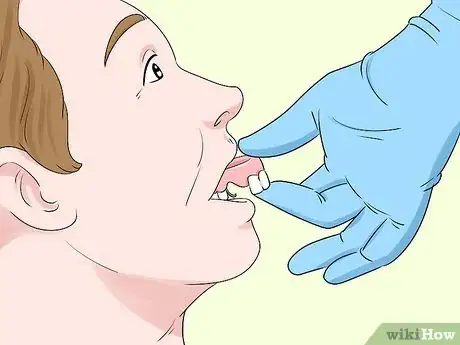

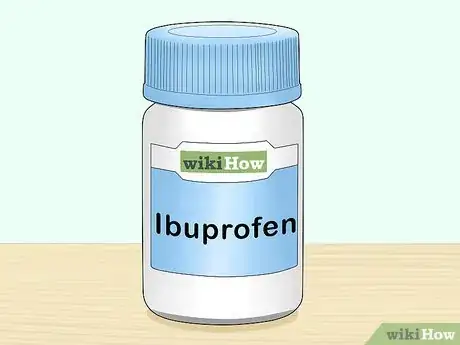





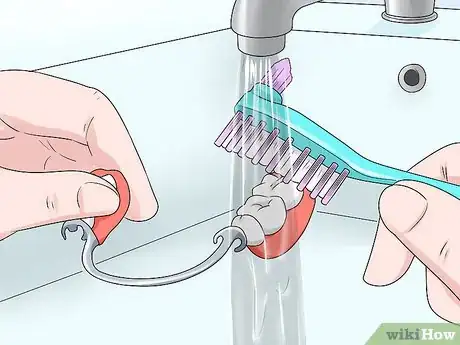
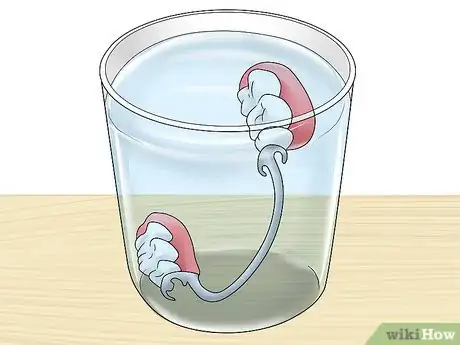
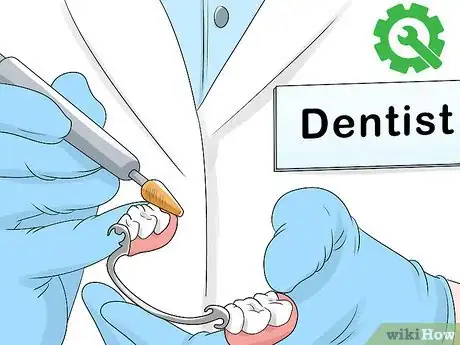
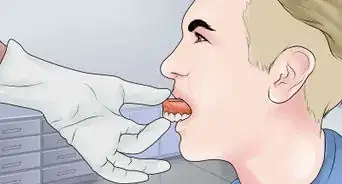


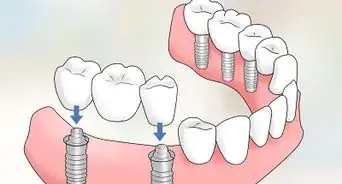

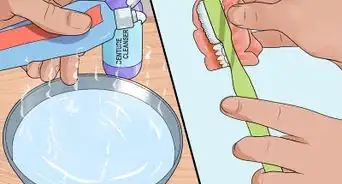

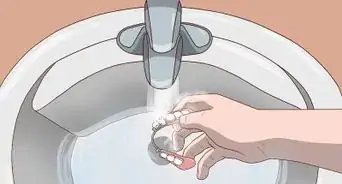
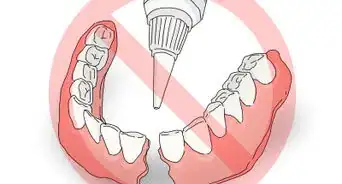
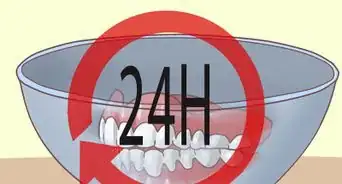










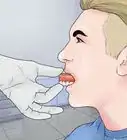


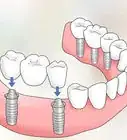



































Medical Disclaimer
The content of this article is not intended to be a substitute for professional medical advice, examination, diagnosis, or treatment. You should always contact your doctor or other qualified healthcare professional before starting, changing, or stopping any kind of health treatment.
Read More...